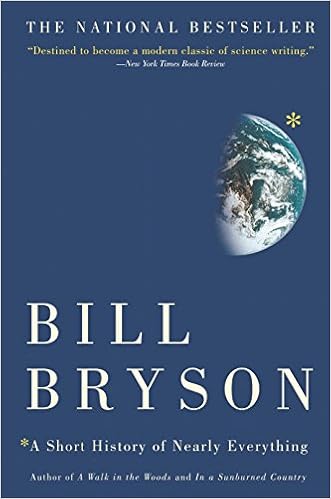Reading Level
What is the reading level of A Short History of Nearly Everything ?
Analysing the books in the series, we estimate that the reading level of A Short History of Nearly Everything is 9th and 10th grade.
Expert Readability Tests for
A Short History of Nearly Everything
| Readability Test | Reading Level |
|---|---|
| Flesch Kincaid Scale | Grade 9 |
| SMOG Index | Grade 12 |
| Coleman Liau Index | Grade 9 |
| Dale Chall Readability Score | Grade 7 |
Reading Time
11 hrs 18 mins
How long to read A Short History of Nearly Everything (Bryson)?
The estimated word count of A Short History of Nearly Everything (Bryson) is 169,415 words.
A person reading at the average speed of 250 words/min, will finish the book in 11 hrs 18 mins. At a slower speed of 150 words/min, they will finish it in 18 hrs 50 mins. At a faster speed of 450 words/min, they will finish it in 6 hrs 17 mins.
| A Short History of Nearly Everything (Bryson) - 169,415 words | ||
|---|---|---|
| Reading Speed | Time to Read | |
| Slow | 150 words/min | 18 hrs 50 mins |
| Average | 250 words/min | 11 hrs 18 mins |
| Fast | 450 words/min | 6 hrs 17 mins |
- Authors
-
Bill Bryson
More about A Short History of Nearly Everything
169,415 words
Word Count
for A Short History of Nearly Everything (Bryson)
18 hours and 13 minutes
Audiobook length
Description
One of the world’s most beloved writers and New York Times bestselling author of A Walk in the Woods and The Body takes his ultimate journey—into the most intriguing and intractable questions that science seeks to answer.In A Walk in the Woods, Bill Bryson trekked the Appalachian Trail—well, most of it. In A Sunburned Country, he confronted some of the most lethal wildlife Australia has to offer. Now, in his biggest book, he confronts his greatest challenge: to understand—and, if possible, answer—the oldest, biggest questions we have posed about the universe and ourselves. Taking as territory everything from the Big Bang to the rise of civilization, Bryson seeks to understand how we got from there being nothing at all to there being us. To that end, he has attached himself to a host of the world’s most advanced (and often obsessed) archaeologists, anthropologists, and mathematicians, travelling to their offices, laboratories, and field camps. He has read (or tried to read) their books, pestered them with questions, apprenticed himself to their powerful minds. A Short History of Nearly Everything is the record of this quest, and it is a sometimes profound, sometimes funny, and always supremely clear and entertaining adventure in the realms of human knowledge, as only Bill Bryson can render it. Science has never been more involving or entertaining.
